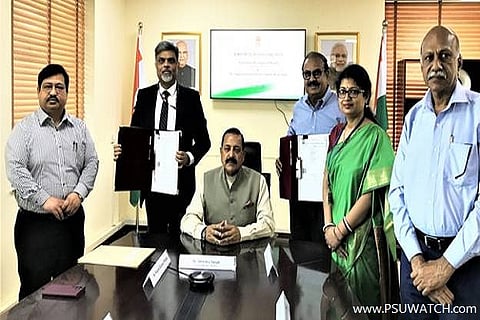
- News Updates
- PSU Watch
- Defence News
- Policy Watch
- हिन्दी न्यूज़
- Jobs Watch
- States News
- Event News

New Delhi: Union Minister Dr Jitendra Singh has called for equal stake participation by Industry to sustain start-ups on Monday. Dr Singh was speaking at the ceremony to sign an Agreement between the Technology Development Board (TDB) of the Ministry of Science & Technology and Sapigen Biologix Private Limited, Hyderabad helmed by Dr Krishna Ella of Bharat Biotech Limited for the development & commercialisation of two novel vaccines – "Intranasal Covid-19 Vaccine and RTS, S Malaria Vaccine." Further, there will be equal stake for both sides with each side contributing Rs 200 crore respectively for ensuring sustainable start-ups.
Dr Singh said that this initiative will ensure equal stake with equal partnership and responsibility for the industry for sustainable start-ups. He said that the vaccine strategy of India symbolises Prime Minister Narendra Modi's idea of an Atma Nirbhar Bharat. He said that India's vaccine strategy brings together pharma, industry and academia together in a partnership with an eye on meeting the current as well as possible future challenges, under the leadership of Prime Minister Modi.
The Union Minister said that the idea behind initiatives like this is to have a sustainable partnership in the long run and provide a sustainable source of livelihood to India's youth. Dr Singh opined that the Government, led by Prime Minister Modi, is encouraging industrial outreach by extending all possible support.
Dr Jitendra Singh said this is not only an agreement of equal stake and partnership but also equal social responsibility. He termed it as a new beginning in India's vaccine strategy and expressed hope that it will give further impetus to research and development in the country.
The Minister noted that today, within only a couple of years of the pandemic, the Indian pharmaceutical industry has been able to develop its own indigenous vaccines. It has also shown the technology absorption capacity to support manufacturing of nearly all the COVID-19 vaccines that have been developed, that too in a cost-effective manner, thus emerging as the "pharmacy of the world". As of March 2021, India exported 5.84 crore doses of COVID vaccines to 70 countries. This has been possible due to the availability of low-cost skilled manpower and a well-established manufacturing ecosystem.
Under the agreement signed today, Technology Development Board and Bharat Biotech have pledged support of Rs 200 crore each to create a continuous corpus of Rs 400 crores for the development and commercialization of two novel vaccines –Intranasal COVID-19 Vaccine" and "RTS, S Malaria Vaccine". The company aims to set up a state-of-the art cGMP facility in Bhubaneswar, in compliance with the latest global standards, for manufacturing Intranasal COVID-19 Vaccine and (RTS, S) Malaria Vaccine initially and later expand the product portfolio by adding other vaccines. The two vaccines to be developed and commercialised are:-
A: Nasal Coronavirus vaccine: In contrast to the Intramuscular (IM) Coronavirus vaccine currently in use, the intra-nasal vaccine can generate mucosal immune response thereby protecting both the upper and lower respiratory system of a vaccinated individual and break the cycle of infection and transmission. The present project uses the technology platform developed by Washington University, School of Medicine in St Louis for the SARS-COV-2 chimpanzee adenovirus in inactivate or killed virus form.
This platform has several advantages: These vaccines express surface antigens that retain their epitope conformations to play an important role in inducing strong preventative humoral responses, especially with reference to SARS-CoV-2. Scaling up is relatively easier. Easy delivery (single dose of 0.1 ml as against 2 doses of 0.5 ml each of I-generation vaccines).Can be administered even by an untrained health worker and self-immunization also possible, No requirement of syringe, needle, and alcohol swabs. Safer to use
B: RTS, S Malaria Vaccine: In view of the public health potential, World Health Organization WHO's top advisory bodies for malaria and immunization have jointly recommended phased introduction of the vaccine in selected areas of sub-Saharan Africa. Three countries – Ghana, Kenya, and Malawi – began introducing the vaccine in selected areas of moderate and high malaria transmission in 2019. Vaccinations are being provided through each country's routine immunization program. As per the forecast of GAVI, the demand for malaria vaccine would be 75 million doses by 2035.
Both the Vaccines are novel and will come under the ambit of commercial production for the first time.
The company aims to produce 100 million doses per annum of intranasal COVID-19 vaccine by April 2023 and 15 million doses/ annum RTS, S Malaria vaccine by the end of April 2025.
(PSU Watch– India's Business News centre that places the spotlight on PSUs, Bureaucracy, Defence and Public Policy is now on Google News. Click here to follow. Also, join PSU Watch Channel in your Telegram. You may also follow us on Twitter here and stay updated.)
